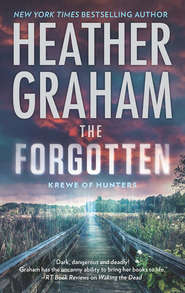По всем вопросам обращайтесь на: info@litportal.ru
(©) 2003-2024.
✖
The Evil Inside
Настройки чтения
Размер шрифта
Высота строк
Поля
He drew the blanket off the boy and turned him around, seeking an injury that might have caused that amount of blood.
But he didn’t find any. If he had, the boy wouldn’t have been standing upright. He wouldn’t have been breathing. He’d have been dead from a wound like that.
He’d already wrapped the blanket around the kid. No undoing that.
And if he could, would he leave the kid there shivering with nothing?
Still standing in front of the boy, who didn’t even reach up to hold the blanket in place, he fumbled in his pocket for his cell phone and hit 911. An operator with a droning voice asked him what his emergency was.
“My name is Samuel Hall. I was driving into Salem when I nearly hit a young man in the road. He’s covered in blood. It doesn’t appear to be his blood, but I can’t be certain that he isn’t injured. He’s standing on his own, and doesn’t seem in any way to be too weak to do so, but he’s nonresponsive. He may be in shock. Can you get someone out here—fast?” He looked around and quickly gave his position as best he could. Hell, it was a quiet backwoods road. He’d opted to take IA north from Boston, but had turned off early. The dark, quiet road through the trees had seemed a soothing path for his first visit home in a long time.
“Stay calm now, Mr. Hall,” the operator told him. “I’ll have a car out to your position immediately. Patrolmen are in the vicinity. It won’t be long. You’re sure the young man isn’t bleeding? If so, you must stanch the flow of blood. Stay calm. Are you doing all right?”
He hesitated for the fraction of a second, staring at the phone, his mind racing. He thought of the horrors he had witnessed in the military, and he thought of the crime-scene photos he’d studied as a criminal attorney.
“Ma’am,” he said, his voice even and strong, “I’m about as calm as a dead Quaker. But you need to get someone out here fast. I’m going to suggest you send an investigator, because I have a feeling this might be human blood, and I don’t want to compromise any more evidence than I already have by putting my blanket around the boy.”
“Of course, sir. Please remain on the line. And do your best to remain calm.”
“If you tell me to remain calm one more time, I’m going to implode and become consumed by spontaneous combustion—”
“There’s already a car on the way. Sir, you just have to remain calm. This is Salem, Massachusetts, sir, and we are moving into the Halloween season now, you know. You may be the victim of prank. Now, stay on the line, and remain calm, Mr. Hall.” She gasped suddenly, her well-learned rhetoric failing her for a moment. “Oh, you’re the Sam Hall—”
He heard the sound of a siren then. “They’re here” is all he said. “Thanks.” He hit the end icon on his phone.
A patrol car pulled up on the road in front of him, and the glare of its lights met and mingled with the Jag’s headlights, almost blinding him for a minute. Two uniformed officers exited from either side of the car, guns in position.
“He’s not armed!” Sam called. “He’s—he’s in shock. He needs medical attention.”
“An ambulance is on the way,” the driver called out. “And Detective Alden. I radioed him on my way out.”
Alden? He wondered if it was his old friend John. Puritan names still abounded here, and John Alden and he had been on the football team together. John had always wanted to be a cop, a detective, actually. He must have worked his way up through the ranks.
The patrolmen walked forward, slowly holstering their guns as they saw that the shaking youth carried no weapon and that Sam seemed nonthreatening, as well.
“Patrolman Nathan Brewster,” one said, introducing himself. “And my partner, Robert Bishop.”
Sam nodded. “Samuel Hall,” he said, but the patrolmen were just staring at the boy. They glanced at each other uneasily.
“Yeah, yeah, Detective Alden is on his way. Any minute now,” Brewster said, almost as an afterthought.
“What’s going on?” Sam asked. The two were behaving curiously. They had holstered their weapons but appeared ready to spring for them again at any second.
Neither touched the boy. Neither spoke to him. The kid was shaking harder and harder, despite the blanket Sam had set around his shoulders. Neither did the boy make any attempt to hold the blanket to his bony frame.
Again, the two exchanged glances. “We’re not really at liberty to say, sir.”
“Fine, well, I think we have to get him into a heated car, or he’ll die of exposure pretty soon,” Sam said. True or not, he couldn’t bear watching the shocked youth stare wide-eyed at nothing and shake anymore.
But before the patrolmen were compelled to respond, the sound of sirens suddenly seemed to grow to an alarming pitch. First on the scene was an unmarked car. A grim, solid-looking man of about fifty in a worn woolen coat and plaid sweater exited the driver’s side of the car and strode quickly toward them.
Plainclothes cop. Detective, Sam thought. He hoped it was John.
And it was.
But unlike the others, he didn’t pull a weapon. He hurried forward, passing between the patrolmen and Sam and the youth. He didn’t look at Sam, but at the boy, and his expression wasn’t authoritarian or harsh, but sad.
“Malachi,” he said. “Good God, Malachi, you’ve done it now.”
“Excuse me. He’s shivering. He’s freezing. He’s in shock. John? It’s Sam—Sam Hall.”
John Alden turned and looked at Sam.
“Sam!”
“I was on my way to the folks’ place. I nearly hit the boy. He was just standing there, in the road. Covered in blood.”
“Sam,” Alden repeated.
He looked as if he was about to say good to see you or something to that effect, but in the road with a blood-splattered boy, it just wasn’t appropriate.
“John, this kid needs help. I think he’s in shock,” Sam repeated.
John Alden nodded and indicated, with the cast of his head, the ambulance that had arrived. “Yeah, he’ll get medical attention. And he’s in shock, you say? He should be. He just hacked his family to death.”
1
Lexington House.
There it stood, on a cliff by the water. It might have been a postcard or a movie poster, and it was as eerie as ever—a facade that graced the darkest horror movie. Its paint was chipping, the exterior was gray and it had been weathered through the centuries by icy winds ripping in off the Atlantic Ocean. The ground-floor windows seemed like black eyes; the second-floor windows might have been startled brows, half covered by the eaves of the roof.
Oddly enough, Lexington House had always remained in private hands. From its builder—the Puritan Eli Lexington—to its recent owner—the now deceased Abraham Smith—it had always found a new buyer after each and every one of its tragedies. People had once known its early history, of course, but that had been lost amid the witchcraft trials that scarred American history and continued to fascinate the social sciences. And when Mr. and Mrs. Braden had been brutally murdered two centuries later, in the 1890s, the world knew that their son had been guilty of the crime. But the legal system had worked for the killer this time, and he’d been acquitted. He and his sister had promptly sold the house to another private party. Eighty years later it had become a bed-and-breakfast, and then it had been purchased by Abraham Smith, who had longed for the property on its little cliff, segregated from all but a few neighbors.
One of whom had been murdered last week.
And now today …
Jenna Duffy had heard about nothing but the Lexington House on the radio since she’d started for Salem from Boston this morning. Uncle Jamie had called her days before, begging that she come to Salem and speak with him. Peculiar timing.
She’d pulled to the side of the road and parked to stare at the place.
A patrol car sat near the house; crime-scene tape cordoned off the entire house. There were no onlookers, though. The house was at a little distance from the historic section of town, where most visitors strolled through the Old Burial Ground, visited the House of the Seven Gables or sought out history at any one of the witch museums or the Peabody Essex Museum. And since it was October and Halloween was approaching, the real-life contemporary tragedy would fuel the ghost stories that were already being told around town.
She stared at the house awhile longer, wondering about its history. What happened at Lexington House would prove to be another horrible case of mental instability or greed, and as much as she longed to actually see the property that brought about such gruesome tragedy, she had a meeting with her uncle. She glanced at her watch and pulled back onto the road. With Halloween tourists clogging the city, it might take her time to get where she was going.
Somehow she was still early.
She parked her car at the Hawthorne Hotel’s parking lot, and wandered across the street to the common.











